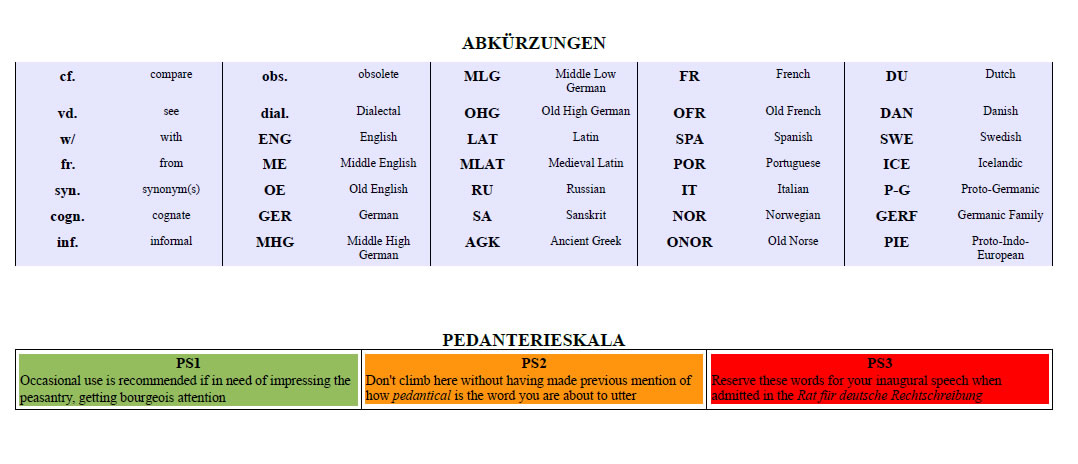Language/German/Vocabulary/DEUTSCH-IM-DETAIL-2
.
ALL LESSONS: 1 | 2 | 3 | 4 | 5 | 6 | 7 | 8 | 9 | 10 | 11 | 12 | 13 | 14 | 15 | 16 | 17 | 18 | 19 | 20 | 21 | 22 | 23 | 24 | 25 | 26 | 27 | 28
Those 28 German lessons for advanced levels have been written by Hector Tormos, real polyglot and member of the Polyglot Club community since 2014. The lessons are presented much like Assimil, with German text, English translation, audio and annotations. They concern the levels C1 or C2 (proficient).
Lesson 2[edit | edit source]
| ZWEITE LEKTION | SECOND LESSON |
|---|---|
| Woher kommt die Wurst?
1 - Man vermische zerkleinertes Fleisch, Speck, Salz und verschiedene Gewürze, manchmal auch Innereien, Blut und Schwarten, und fülle die Masse in natürliche Därme oder künstliche Hüllen. 2 - Nun muss das Ganze räuchern, erhitzen, trocknen oder reifen – und fertig ist die Wurst. Wer sie erfunden hat, bleibt im Dunkeln. 3 - Aber Überlieferungen machen deutlich, dass die Wurst schon im achten Jahrhundert vor Christus erwähnt wurde: bei Homer. 4 - In seiner "Odyssee" berichtet der Dichter von "Wurstkämpfen", die die Griechen ausgetragen haben. Der Tapferste bekam die besten Würste als Belohnung. 5 - Demnach liegt der Ursprung bei den Kelten, die die Bratwurst entdeckten. Von dort nahm sie ihren Weg über Rom in die heimischen Gefilde. 6 - Die Franken sollen es gewesen sein, die die Bratwurst kultiviert haben und von da an es ist rundum vermutlich populär geblieben. 7 - Erwähnt wird sie erstmals im 11. oder 12. Jahrhundert, da kannte man schon die "lebarwurst" und ratwurst". Im Mittelalter tauchten die ersten Metzger auf, die für Gastwirte arbeiteten. 8 - Die Wurst war aber nicht nur eine Gaumenfreude für den "kleinen Mann". Es gab berühmte Wurstliebhaber wie Friedrich der Große, Johann Wolfgang von Goethe oder Martin Luther. 9 - Über letzteren kursiert eine unrühmliche Legende: Luther ließ sich in einer Gaststätte bei Erfurt seine Bratwurst schmecken. Dann verließ er die Schenke, jedoch ohne zu bezahlen. Ob es aus Eile oder Versehen geschah, lässt die Geschichte offen. 10 - An der Tür des Wirtshauses wurde daraufhin mit Kreide vermerkt, dass Luther seine Bratwurst schuldig geblieben sei. Daher kommt, so sagt die Legende, unsere heutige Redensart "jemandem etwas ankreiden". |
Where does the wurst come from?
1 - One mixes minced meat, bacon, salt and various spices, sometimes also offal, blood and casings and encases the mix with natural or artificial guts. 2 - Now it all must be smoked, heated, dried or matured - and ready is the wurst. Who invented it, remains in the dark. 3 - But the tradition makes it clear, that the wurst was already mentioned in the eighth century before Christ: by Homer. 4 - In his Odyssey, the poet tells about the "Wurstkämpfen", for which the Greeks fought. The bravest got the best wursts as reward. 5 - Nevertheless, the origin lays among the Celts, who discovered the "bratwurst". From there, it went its way to Rome in the domestic realm. 6 - The Franks must have been the ones that prepared the "bratwurst" and since then it has probably remained popular around. 7 - It is mentioned first in the 11th or 12th century, when it was known as "lebarwurst" and "pratwurst". In the Middle Ages the first butchers who worked for inkeepers appeared. 8. The wurst was not only a treat for the "little man". There were famous sausage lovers like Frederick the Great, Johann Wolfgang von Goethe and Martin Luther. 9 - An infamous legend circulates about the latter: Luther allowed himself the taste of a wurst in a restaurant in Erfurt. Then he left the tavern, but without paying. The story leaves open if that happened out of haste or an oversight. 10 - At the door of the tavern it was then indicated with chalk that Luther owed his bratwurst. From here, says the legend, comes our modern expression "hold something against someone" (to "chalk up" something to someone). |
Audio[edit | edit source]
Notes[edit | edit source]
Wurst translated sometimes in English simply as "sausage"[edit | edit source]
• The origin of the word is still being debated, probably because philologists need to taste more samples before casting the final
verdict. The most popular theory makes it derive fr. P-G
*wurstiz (twisted), which itself comes PIE *wert- (RU вертеть "to rotate", LAT vertō "I turn, revolve, exchange"...)
• Early -18th c.- attested proverbs include mit der Wurst nach dem Schinken werfen
(roughly: "throw a sprat to catch a mackerel", that is, to make a lesser sacrifice in pursuit of a greater reward)
Gewürz (n) spice, seasoning[edit | edit source]
• Fr. 15th c. OHG Wurz (f) herb, spice, root (syn. Pflanze, Kraut)
• Cogn. DAN urt (herb), SWE ört (herb), ENG wort, as in gutwort, gypsywort, coralwort, scurvywort...
Schwarte (f) thick, greasy animal skin, particularly pork[edit | edit source]
• Cogn. DU zwoord, zwoerd (hairy skin, pork rind) and ENG sweard
• Also used to refer to to the human skin (inf.) or to a book that is either old or bad
• Diese uralt deutschen Fragen, die noch der Lösung harren, trotz verstaubter Schwarten, die ganze Bibliotheken verstopfen
These age-old German questions that, despite (the) dusty old books that clog entire libraries, still await solution
• Schwarte is one of the many ingredients out of which gelatin can be made
natürliche Därme oder künstliche Hüllen[edit | edit source]
• These are the two options for the wurst wrapping, ie, the traditional one or the modern one. To pierce the German mind deeper, we have to delve into corners of the web such as
gutefrage.net (kind of a German Yahoo Answers), where an interested party asks Ist eine essbare Wursthülle nur ein Kunstdarm?
Is an edible wurst casing just artificial gut?
and, consequently, receives help from the community
• Darm (m) intestine, gut
• Cogn. w/ DAN, SWE tarm (intestine, gut), DU darm (bowels), ENG tharm (entrails, guts)
• Darmflora: intestinal flora
• Hülle (f) covering, wrapping, case, sheath, husk
• Fr. OHG hullan: to cover, to wrap.
• Whence DU hullen: to wrap
austragen to bear, to deliver, to deal with, to strive for, to fight[edit | edit source]
• Viele heiße politische Konflikte werden heute nicht mehr in den Kantonen ausgetragen
Many hot political conflicts are no longer dealt with in the cantons today
• In einem gestern abend ausgetragenen Waldgefecht wurde eine feindliche Division aufgerieben, die eine Umfassungsbewegung unternommen hatte
Last night, an enemy division -which had carried out an outflanking- was wiped out in a (fought out) forest skirmish
tapfer bold, fearless[edit | edit source]
• Fr. MG *dapraz (elegant, stylish, handsome)
• Cf. w/ RU дебелый (stout, strong), DU dapper (brave, nimble) and its derivate in ENG dapper (neat, trim, spiffy)
• Syn. wacker, couragiert, mutig
demnach[edit | edit source]
although it usually has the sense of "hence, so, thus", demnach is sometimes used more as a chain-word -to add to what has been expressed before- than as a marker of causality, especially in informal contexts
auftauchen come up, surface, pop up, appear[edit | edit source]
• Cf. w/ tauchen: to dive, bathe, SWE dyka (to dive), DU duiken (to dive) and ENG duck (as a verb) and, of course, Johannes der Täufer -John the Baptist-, a famous character in the tauchen and auftauchen business
• In den Lüften aufzutauchen darf kein Wölkchen sich getrauen, / auf das Glück der treuen Liebe will der ganze Himmel schauen
No cloudlet must dare appearing in the skies, / so that with the joy of true love the whole heaven will shine (Nikolaus Lenau, Gedichte)
• Wir kennen keine anderen Fragen und Probleme als solche, die unter Schriftstellern und Gelehrten auftauchen
We know of no question and problem except for those that arise from writers and scholars
Gaumenfreude (PS1) a culinary delicacy[edit | edit source]
• Gaumen (m) palate, vault, oral cavity
• Fr. OHG guomo (palate) out of P-G *gōmô (palate) and cogn. w/ ENG gum
sich lassen to allow (reflexive), to render something possible[edit | edit source]
• Je nach dem Marktbedarf kann die Möhre früher oder später
geerntet werden. Spätmöhren lassen sich gut lagern und sind auch sehr gut transportfähig Depending on the market demand, the carrot can be harvested sooner or later. Late carrots can be easily stored and are also transport-friendly
• The obsessive reader can find a good review of the many uses of the verb lassen here
Gaststätte (f) restaurant[edit | edit source]
• FALSCHERFREUNDALARM we shall not translate
Gaststätte as 'guest house' in the modern sense; while time ago these concepts were synonyms, we better dissociate them now, except when making a translation of The Canterbury Tales and the likes
• Related terms are Bistro (bistro, bar), Gastwirtschaft (tavern), Kneipe (saloon, bar, pub), Dorfkrug and Dorfwirtshaus (a cosy village inn), Schenke (a pub, and a word that appears in the second lesson of Deutsch im Detail), Gartenlokal (a restaurant for old people)...
Erfurt[edit | edit source]
Erfurt is the capital city of Thuringia, where Luther went to university, and near which it was found the oldest rune-inscription to be unearthed so far in Central Germany, the Kamm von Frienstedt.
jemandem etwas ankreiden[edit | edit source]
this expression now even comes with its own verb: ankreiden
• Den größeren Teil der Schuld bekommt auf jeden Fall aber der Anfahrende angekreidet!
The biggest part of the blame was definitely cast onto the approaching (vehicle)
• Eigentlich sollte er nach dieser WM über Zweifel erhaben sein, doch seine Kritiker werden ihm diese Niederlage ankreiden
Actually, he should be beyond doubt after this World Cup, but his critics will continue holding this defeat against him
Legend[edit source]
Author[edit source]
Hector Tormos
- Find more language videos in my YouTube Channel
Download all lessons[edit source]
Download for free all 28 lessons from my course "Deutsch im Detail".
ALL LESSONS: 1 | 2 | 3 | 4 | 5 | 6 | 7 | 8 | 9 | 10 | 11 | 12 | 13 | 14 | 15 | 16 | 17 | 18 | 19 | 20 | 21 | 22 | 23 | 24 | 25 | 26 | 27 | 28
Other Lessons[edit | edit source]
- Animal Sounds
- Body
- Feelings and Emotions
- Colors
- Camping
- Animal
- DEUTSCH IM DETAIL 1
- Greetings
- Vehicles
- How to Say Hello and Greetings




